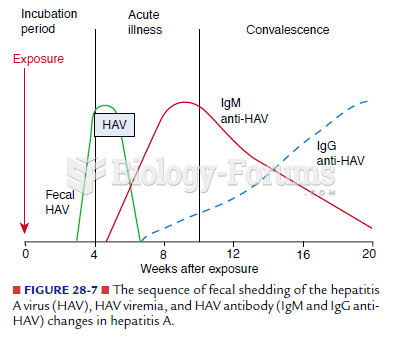Answer to Question 1
4
Rationale 1:Water is incorrect because hepatitis A is transmitted through food and water contaminated by feces.
Rationale 2:Food is incorrect because hepatitis A is transmitted through food and water contaminated by feces.
Rationale 3:Germs is incorrect because germs is a general term encompassing bacteria, viruses, fungi, and protozoa.
Rationale 4: Hepatitis B (HBV) is found in blood and certain body fluids. It is spread when blood or body fluid from an infected person enters the body of a person who is not immune. HBV is spread through having unprotected sex with an infected person, sharing needles or works when shooting drugs, needle sticks or sharps exposures on the job, or from an infected mother to her baby during birth. Exposure to infected blood in any situation can be a risk for transmission.
Global Rationale: Hepatitis B (HBV) is found in blood and certain body fluids. It is spread when blood or body fluid from an infected person enters the body of a person who is not immune. HBV is spread through having unprotected sex with an infected person, sharing needles or works when shooting drugs, needle sticks or sharps exposures on the job, or from an infected mother to her baby during birth. Exposure to infected blood in any situation can be a risk for transmission. Hepatitis A is transmitted through food and water contaminated by feces. Germs is incorrect because germs is a general term encompassing bacteria, viruses, fungi, and protozoa.
Answer to Question 2
3
Rationale 1:I might experience a decrease in urinary flow is incorrect because the primary adverse effect of cyclosporine occurs in the kidney, with up to 75 of clients experiencing reduction in urine flow.
Rationale 2:I can take ibuprofen (Advil) for a headache, but I have to be very careful is incorrect because while cyclosporine can damage the kidneys, other nephrotoxic drugs such as amphotericin B, NSAIDs, or aminoglycosides should be administered with great caution.
Rationale 3:The client should avoid grapefruit and grapefruit juice.
Rationale 4:I will need to come into the clinic for periodic blood counts is incorrect because frequent laboratory tests of kidney function are necessary.
Global Rationale: The client should be instructed to avoid and eliminate grapefruit and grapefruit juice from the diet while on the drug. The client will experience a decrease in urine flow and should have laboratory values checked. Caution with cyclosporine and other drugs nephrotoxic to the kidney such as amphotericin B, NSAIDs, or aminoglycosides.







